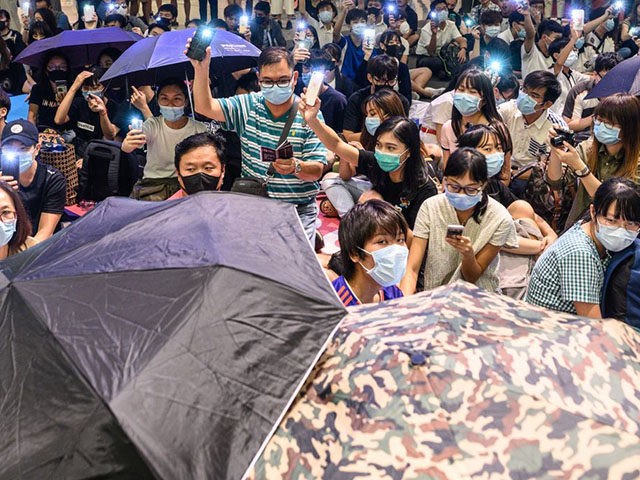Hong Kong police on Friday rescinded their ban against a protest march scheduled for Saturday afternoon, although they added a restriction that the event — which is somewhat tangential to the main thrust of the protest movement — must conclude sooner than originally scheduled to reduce the risk of violent behavior after dark.
The Hong Kong Free Press explained the unusual nature of the Saturday protest:
The “Reclaim Tuen Mun” event — the second of its kind since the anti-extradition bill movement began — is targeted at the “singing aunties” who frequently appear in the local park. Organisers have demanded that the government change its regulations to prohibit begging and performing for money in the park, to improve law enforcement, and to listen to complaints from the neighbourhood.
The march will begin at the San Wo Lane playground at 2pm and will head towards the Tuen Mun Government Offices. Organisers received permission for the event to last until 5pm.
“The dai mas in Tuen Mun Park are no longer just a problem of noise pollution, there is a fully-fledged industry behind them. Tuen Mun residents, Hongkongers, are you willing to see your park become a free platform for dai ma groups to earn money every day?” the organisers wrote.
Police on Wednesday banned the event citing concerns over potential violence and traffic obstruction. However, the Appeal Board on Public Meetings and Processions overturned the decision on Friday and gave the march a green light.
The phrase dai ma or dama means “big mama” and is meant as a derisive reference to the appearance and inappropriate behavior of many park singers. To put the popular opinion of the singers bluntly, they are seen as middle-aged women singing bad karaoke tunes while dressed in skimpy outfits to cadge money from old men who hang around in the park.
A large protest against the dai ma singers was held in July, denouncing them as visual and audible nuisances who often made park visitors uncomfortable by engaging in indecent behavior or actively soliciting prostitution.
A smaller but spirited counter-protest was soon held by old men who wanted the big mamas to come back. “I paid to touch the ladies’ hands. Why can’t I touch dai mas?” one of the dismayed men marching under a “Singing Is Not a Crime” banner asked plaintively.
Critics accuse the singers of taking advantage of performance zones established in the park for what Americans might think of as folk singers. The risque performances of the dai ma sometimes draw unruly crowds large enough to interfere with other people trying to enjoy the park. Some accuse the Hong Kong police of tacitly indulging the singers by refusing to enforce ordinances that would control their behavior.
“The problem has obviously got out of control. Ten years ago, it was only Cantonese opera singers who performed in an orderly, respectful manner. Now it’s just these groups singing songs nobody wants to hear, and trying to out-sing each other by turning up the loudspeakers to full blast,” Hong Kong Democratic Party Councillor Catherine Wong Lai-sheung remarked in July. According to park rules, the singers are not supposed to be using loudspeakers at all.
The dai ma protest flowed into the massive demonstrations against mainland Chinese infringements of Hong Kong’s autonomy over the summer, in part because the Tuen Mun marchers shared the larger protest movement’s unfavorable view of Hong Kong’s government officials and police.
After the demonstration in July, a good deal of anger was expressed at the police for cracking down much harder on the demonstrators than on the dai ma. Some believe the dai ma are indulged by Hong Kong authorities because most of them are mainland Chinese. The most dire version of this critique holds that the dai ma are encouraged to ply their trade by the mainland Chinese government as part of its campaign to erase Hong Kong’s unique culture.
Tuen Mun’s “self-entertainment zones” were ostensibly scrapped after the July protest, but a backlog of already-approved performance applications was allowed to proceed. Organizers of the protest scheduled for Saturday insist the dai ma are still a major concern which the authorities have not addressed despite their promises.

COMMENTS
Please let us know if you're having issues with commenting.